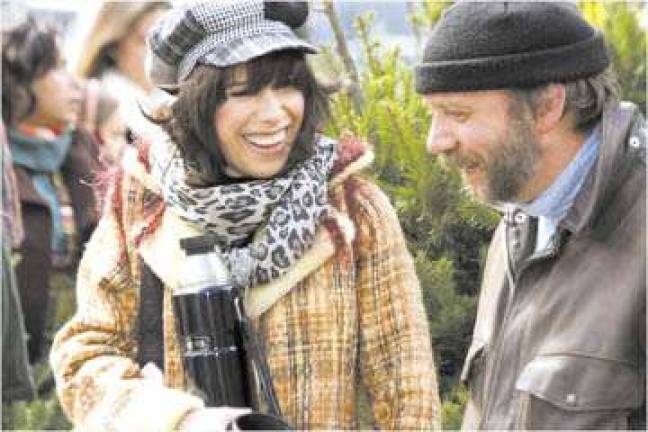All About Face

Paul Giamatti and Phil Morrison unravel indie cynicism
The reliably dyspeptic Paul Giamatti can also show a kind face although few filmmakers bother to feature that aspect, probably because it can veer into self-pitying mush (as in Cinderella Man, his Oscar-consolation-nomination after being snubbed for Sideways) but director Phil Morrison reins Giamatti perfectly in All Is Bright. This is a "dark" Christmas movie yet Morrison and Giamatti look kindly from a ledge into the abyss of mawkishness.
It's quite a balancing act: everything in indie film culture dictates a skeptic, secular anti-Christmas attitude and this story--about Giamatti as Dennis, a Montreal thief and ex-con who, while serving time, loses his wife Therese (Amy Landecker) and daughter Michi (Tatayana Richaud) to a former accomplice--steadily moves toward grimness yet All Is Bright proves true to its title. And not as irony.
Like its lead actor, the film subtly changes faces. What's grim softens, darkness brightens. On parole, Dennis claims a right to his old partner Rene's (Paul Rudd) latest petty venture, forcing his way into a new hustle hauling Christmas trees from Canada to sell on the streets of Manhattan.
In part, All is Bright is a road movie recalling that 70s range of class experience revealed when characters traveled from one locale to another. Coming down from the Canadian provinces, Dennis and Rene lack urbanity but out of the tension of their friendship (clear resentment and concealed brotherly affection) emerges a kind of sophistication. (The men's underlying sexual-spiritual anxieties recall Daniel Taplitz's fine underrated Chaos Theory.) They accept each other along with life's disruptions and discouragements. Their emotional resilience gives them nerve and keeps them going.
Just 70s American movies let the road convey a sense of venturing toward an unknown social destiny, All Is Bright's background Christmas theme revises contemporary morality. Its recognizably humane characters adjust to their circumstances. Dennis doesn't hope to recover his marriage yet trusts it as his emotional anchor. Rene's ambitions are similarly small but graspable. They're both adaptable and responsive in grappling with problems (crossing the border) or dealing with new challenges (competitive street hustling) whether coping together or with others as when Dennis sells a tree to a frustrated Russian immigrant Olga (Sally Hawkins of the indomitable smile--even when brusque and cynical, she yet seems to be smiling inside). Dennis and Olga aren't romantic, they're soul-mates.
These are real characterizations not superficial attitudes like the role Hawkins got stuck with along with everyone else in Woody Allen's shoddy, amoral Blue Jasmine or the facile male-bonding that Rudd essayed in David Gordon Green's unfulfilled buddy movie Kid Avalanche. Hawkins occasions one of Morrison's loveliest moments: catching Dennis in a room by himself, listening to Olga play piano for her old lover Vladimir (Morgan Spector), he realizes the depth and reach of his own affection. The expanse of solitary feeling in this simple cut reminded me of the surprising moment in Morrison's Junebug when Alessandro Nivola sang. Morrison's sensitive perceptions are always unforced. So the series of imperfect reconciliations that conclude All Is Bright are quietly moving. In the burnt forest of indie movie cynicism, Morrison's epiphanies hang like ornaments on a tree.